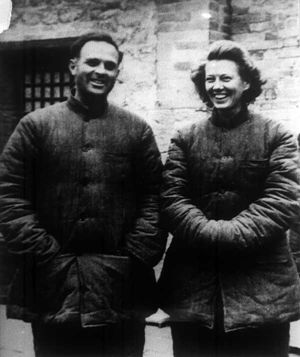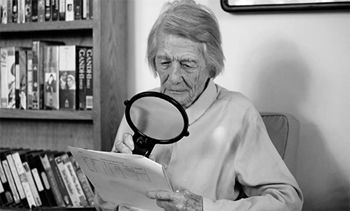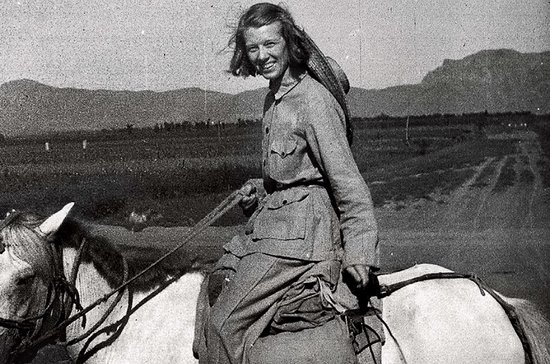 Isabel Crook was born into a Canadian missionary’s family in 1915 in Sichuan province. Her father worked as the dean of Huaxi University (华西大学) and her mother ran a local kindergarten.
Isabel Crook was born into a Canadian missionary’s family in 1915 in Sichuan province. Her father worked as the dean of Huaxi University (华西大学) and her mother ran a local kindergarten.
Isabel spent most of her youth days in China before moving to Canada where she obtained a master’s degree in 1938. Then she returned to Chengdu, the capital of Sichuan province to conduct a survey in a local village called Xinglong (兴隆), where she met her life-time soul-mate David Crook. The two got married in London in 1942.
Crook was born into a middle-class Jewish family in 1910. He was educated at the Cheltenham College, and at the age of 18 left London for New York. There he worked in the garment trade, but in 1935 also completed a degree at Columbia University.
When back in Europe, Crook moved to Spain in 1936 to join the International Brigade. During that period, he got to read Edgar Snow’s Red Star over China. In his view, there are similarities between China’s anti-Japan war and Spain’s anti-fascist campaign.
So, he decided to go to China to report on the Asian country’s relentless fight. In 1938, Crook was recruited by Stalin's Communist International and sent to Shanghai. When he finished his assignments, Crook began to work as a teacher at Shanghai St. John University and later at Jinling University.
When the World War Ⅱ started, the couple went back to Britain and devoted themselves to the anti-fascist fight. Crook joined the Royal Air Force and was sent to India, Ceylon, and Burma while Isabel served in the Canadian Women's Army Corps.
At the end of the war, the couple decided to return to China which was in the throes of a civil war. In 1947 they evaded a nationalist blockade to cross into a communist-controlled area in North China. There they observed the land reform and collected research materials on revolution in a Chinese village called Shilidian (十里店).
At the time, Shilidian only had a population of 1,500 with a cultivated land area of 4,000 mu (266 ha). The couple immersed into the local life by participating in all kinds of local events, and living and eating together with villagers.
In 1948, they finished their book Ten Mile Inn (十里店).
When the couple planned to go back to Britain, the leaders of the liberated areas in China asked them to stay back and help in cultivating English language talents for the newly founded Republic of China. Consequently, the Crooks gave up their original plan to return home and stayed back in China for the rest of their lives.
In June 1948, they became teachers at the Nanhaishan Foreign Affairs School. Soon, the People’s Liberation Army marched into Beijing, and the school they served also moved into town and later became Beijing Foreign Studies University.
In 1947, when Isable was in Shilidian for social survey. Photo: images.baidu.com
Isabel was always interested in the social issues related to China’s countryside and farmers, and never stopped her research on China’s countryside. As early as 1938, when Isabel began to survey a Tibetan village in the Aba Tibetan autonomous prefecture in Sichuan province, she tried to introduce the developed yak hair spinning technology to the local villagers.
From 1940 to 1941, Isabel spent a year and a half on visiting 1,497 families. In the seven decades since her return to China in 1938, she had travelled almost all of China. “I’m quite fortunate for choosing to stay. As a social anthropologist, I’m drawn to China all along and my experiences here made me a witness of Chinese countryside’s vicissitudes,” she was quoted as saying.
In 1960, the couple got invited to the University of Leeds in Britain, at a time when China’s economy was going through a difficult phase. The couple once again chose to stay, and were soon granted permanent residence right in China.
Isabel still lives in the teachers’ dormitory building of Beijing Foreign Studies University. As a veteran teacher, she has taught here for over six decades, helping thousands of young Chinese to learn English. Their students constitute the main body of English language talents now serving in various government departments or commercial institutions. They have nurtured many students who are now like celebrities in their fields.
Throughout these years, people around Isabel found her to be a woman full of love. She loves her students, her research, and her teaching career.
She always took her teaching work seriously. She would keep a record of each student, which contained elaborate details of the student’s learning status and problems, which she used to solve problems the student confronted in learning. According to her students and co-workers, although she is not a native Chinese, the lady did not give an impression of being foreign at all. Her looks and smiles resembled that of their own mothers and of a true teacher who is always ready to help.
According to Michael Crook, the second son of Isabel, she was especially drawn to research and always hoped to find new things, so she never stopped writing articles till she was very old. “After retirement, she is still quite busy. In the morning, she would spend one hour before breakfast, and then after the breakfast, she would continue to read and write,” said Michael.
What is especially remarkable is that she continues to handle e-mails and search on the Internet even though she is over 90.
The couple has three sons, six grandchildren and two great grandchildren. Their eldest son Carl is now a well-established red wine importer; second son Michael is teaching at the Western Academy of Beijing, and their youngest son Paul is a producer for BBC.
 Isabel has fond feelings for Xinglong town where she had lived and where she firstly met her husband.
Isabel has fond feelings for Xinglong town where she had lived and where she firstly met her husband.
“I love the place, mainly because I met a real communist here (referring to her husband David), who helped me to know the society and significance of the Chinese revolution,” said Isabel.
According to her, the most meaningful revolution in modern times happened in China and so China is the most representative case for a sociologist.
A pair of scrolls that says “He really gave his all till his heart ceased to beat. 鞠躬尽瘁,死而后已” could be found at her home, which can be viewed as the true portrayal of what the couple did for the world peace and Chinese people.
 Isabel Crook was born into a Canadian missionary’s family in 1915 in Sichuan province. Her father worked as the dean of Huaxi University (华西大学) and her mother ran a local kindergarten.
Isabel Crook was born into a Canadian missionary’s family in 1915 in Sichuan province. Her father worked as the dean of Huaxi University (华西大学) and her mother ran a local kindergarten.
 Isabel has fond feelings for Xinglong town where she had lived and where she firstly met her husband.
Isabel has fond feelings for Xinglong town where she had lived and where she firstly met her husband. 